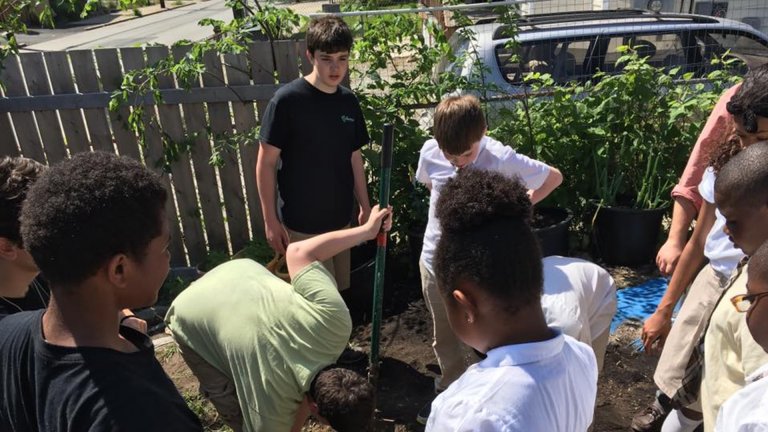
The Greene School (TGS) is as Statewide Public Charter School in Rhode Island. We serve students from twenty-two districts across the state of Rhode Island including urban, suburban, and rural communities. We are a unique schooling option for students in grades 9-12 because of our commitment to engaging a diverse student population in environmental education and social justice. The capacity building challenge we have taken on is to increase the quality and relevance of our curriculum, particularly for our urban students. Additionally, our goal was to plan and execute service learning within one of our urban communities.
This year we have expanded our focus on engaging our student within the Providence “Urban Ring” communities, particularly in our 9th and 10th grade curriculum. We made adjustments at both grade levels to increase relevance for our student body. One strong example of this was a case study in which students explored the land use history of Mashapaug Pond, Providence's largest freshwater water body. Students all composed letters to the editor that highlight and summarized both the historical land use practices and the water quality impacts that society has had on the pond.
Another example of a successful curriculum revision was the Food and Justice for All service learning field experience in South Providence. The project was a collaboration between Groundwork Providence, The Greene School, and Bishop McVinny Elementary School. TGS students led academic workshops about food justice, culinary arts, and healthy eating, while other groups participated through planting gardens and starting plants from seeds with recycled newspaper pots. Students who were previously less engaged who live in the urban neighborhood expressed how it was “fun to work with students that live in different parts of the city” and that although “there are not many gardens and mostly fast food in that neighborhood, it was fun to share what we know about food and healthy eating.”
Core academic projects were also developed as an outcome of the service learning experience. In their ELA class students wrote proposals about how to improve the health and wellness of the communities they live in. One of our 9th grade students from Central Falls, Jacqueline Rodriguez, analyzed census data about the number of residents enrolled in SNAP and WIC assistance programs. In response to her analysis she wrote her proposal to fund the creation of community gardens in Central Falls. She explained in her proposal that “this project is important, but it is more important to those kids who are going to get this opportunity. Gardening is something that students in most low-income neighborhoods do not have. Many kids like me that grew up in that same neighborhood and never got taught how important farming and planting to life.” She continues to explain that her project would “help the community by seeing how kids have fun growing foods which can be taken home when they are fully grown. Many kids will explain this to their parents and then they will be eager to do it at home. In the long term this will inspire other kids to plant. When kids are taught by older kids they tend to observe more and memorize many things about the lesson. This makes them eager to do what we taught them for example, you teach a little kids how to do something but you just tell him you don’t show him. So this will make him get the stuff and do the slime without nobody knowing."
Our primary roadblock in this process had been the level of organization that goes into the intentional and backwards planning of curriculum objectives. While our teachers do have approximately an hour of common planning time every other day, they often struggled to complete all of the objectives of their traditional agenda items, in addition to the added expectations of this innovative work. Our next steps are to deepen the learning experience to allow for more depth of content to make connections from multiple courses.
